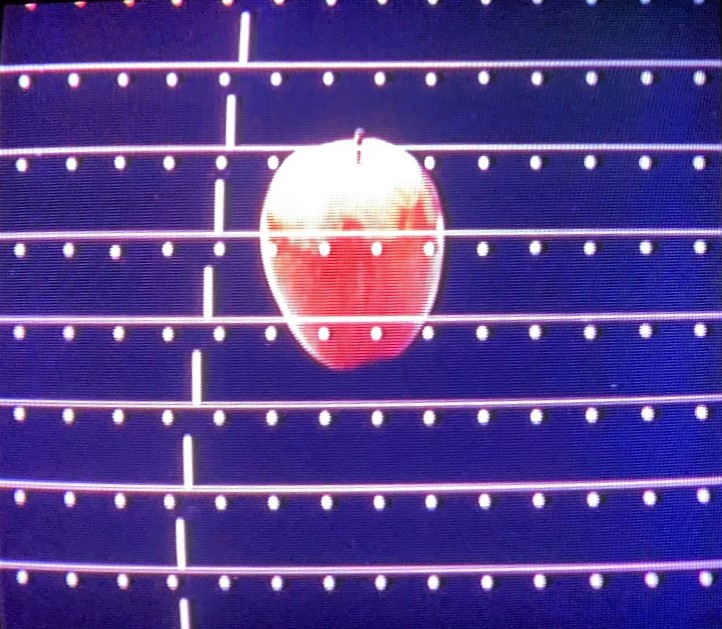|
Word Gems
exploring self-realization, sacred personhood, and full humanity
Einstein
return to "Einstein" main-page
an apple falling to the ground passes through an infinite number of "time zones"

A not uncommon occurrence: An apple falls from a tree. However, as it nears the gigantic body of mass that is planet Earth, time, for the apple, slows down.
Further, in contra-distinction, Einstein said that any object, moving away from a massive source, will experience time “speeding up.”
This is why clocks run faster on an airplane (due to altitude, but, motion causes time to slow down), or on the second floor of a building, as opposed to ground level. The ordinary senses of a human being cannot detect this tiny disparity of time. However, if we were to measure this with a super-accurate atomic clock, we’d find a difference of several billionths or trillionths of a second.
In the above photo, see the horizontal lines, through which the apple plummets downward. We can think of these as “time zones”; the horizontal lines are drawn arbitrarily – we could have 2 or 2 million time zones, or an infinite number - between the branch of the tree from which the apple fell and the ground below.
The point is this: As the apple falls, it “passes through” regions of time that are slowing down. This is indicated by the short vertical lines just to the left of the apple. Notice that the uppermost vertical line is farthest to the right; the one below is a little to the left, and so on, down the series of horizontal regions. This progressive shift to the left indicates that time is slowing down as the apple moves through these temporal regions.

Cut. Freeze action. Let’s say you were a little insect living in one of these time zones. For you, everything would seem normal. Time would be flowing, from your perspective, as it always has. But from the vantage point of an observer on the ground, it would appear differently. From the ground, we would look at our clocks and see one read-out of time, but if we observed clocks, in the higher time zones, through which the apple is falling, we would notice that these clocks are running faster than those on the ground.
time is relative, that is, time unfolds at different rates in different frames of reference; it's directly affected by mass
There’s something else happening, too. As the apple falls, its velocity will be accelerating. As there is no “free lunch” in physics, we must ask, where is the energy coming from that causes the apple’s downward trajectory to accelerate?
why do objects accelerate when falling, why not fall at a constant rate
We’re told by physicists that, in a “conservation” dynamic, the lost energy from the slowing of time is converted to an energy which accelerates the apple.
|
Factors affecting the flow of time:
Gravity or mass of an object slows the rate of time.
Altitude, distance from a massive object, speeds up the flow of time. In the movie "Interstellar," because the travelers were close to a black hole, an hour there was equal to seven years on Earth.
Motion, the faster you move through space, the slower you move through time.
Editor’s note: When I first started looking at this subject, I found it difficult to remember which factor increased or decreased the rate of time. But then I began to understand the process more, and now it’s not so confusing. Here’s how to look at it: Motion slows time because, think of the extreme case, if you were a photon traveling at the speed of light, there would be zero time for you, and so, we can think of any motion as just a step toward light-speed. Gravity, with its heavy hand, warps not only space but time, as well; as a result, time slows down. And altitude is just a variation on gravity; in that, the farther you are from a massive body, the less gravitational impact it will have on you, and therefore, altitude, or distance from a massive body, speeds up time.
|
|
How does time unfold in the afterlife?
From thousands of afterlife reports, testimonies from those on the other side, we learn that time often flows differently, faster or slower, over there than on Earth.
In the “holodeck” article we discussed the existence of special, individualized worlds designed for one to explore, to enact or re-enact, to experience events of one’s life and thwarted desire; therein, time might unfold very differently relative to “time proper” in Summerland.
How does this work? We begin to discern the answer as we learn that time is affected by factors such as mass, gravity, and motion. This being the case, it’s not hard to imagine how a “turning of the dial” for the flow of time, faster or slower, might be affected by a linkage to these three factors.
Think of movie “Interstellar.” The astronauts conduct a mission on a planet which is very near a massive black-hole; as such, time on the planet slows down greatly relative to Earth-time: one hour on the planet is equal to many months or years back home. The astronauts themselves, while on the planet, perceive no difference in the flow of time, all appears to be normal, but when they return to their spaceship they find that time for others has seemed like years.
|
|
Editor's last word:
I think we can clear up seemingly disparate reports about time on the other side: Is there time or not?
If you're doing "normal" Earth-like things in Summerland, you will experience a sense of time (not necessarily Earth-time). In fact, as the great philosophers have pointed out, there could be no such thing as motion without time, as it takes time to go from "here to there"; on the subatomic level, too, particles are vibrating at a certain rate, and this vibratory "motion" takes time to display itself. And so there is such a thing as time in Summerland.
But, if you're traveling at the speed of thought, if you're living life "on the level of the gods," so to speak, there will be no sense of time for you.
|
|

